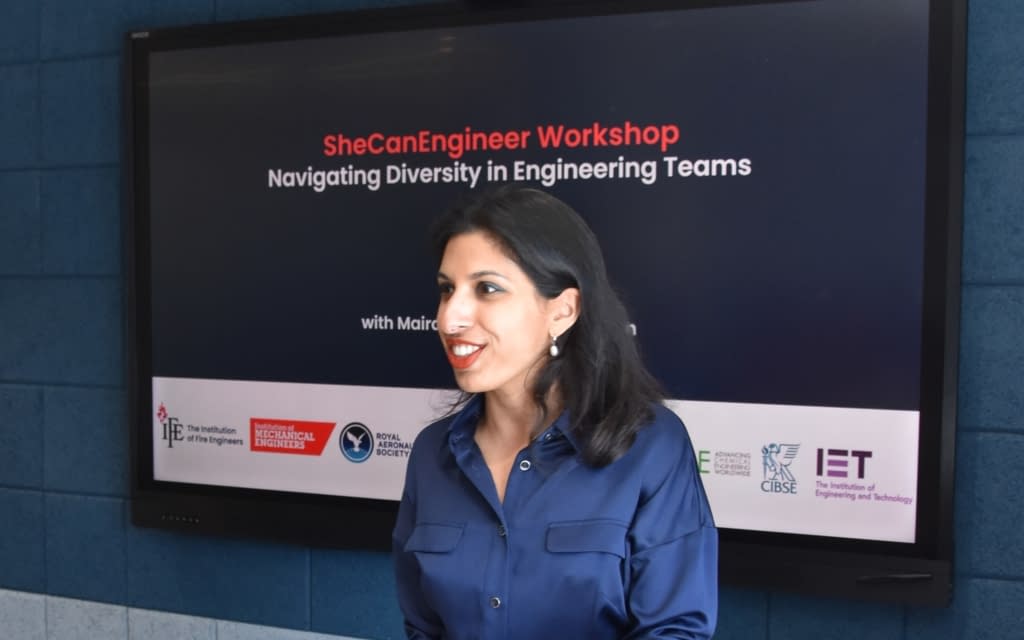Maira Shernaz Bana, co-founder of SheCanEngineer and Head of Computational Engineering at Red Engineering Design, was recognised with a British Empire Medal (BEM) for her contributions to diversity in engineering in The King’s New Year Honours in 2025.
Balancing her dual roles, Maira plays a crucial part in the data centre industry, which serves as the backbone of the digital world. These high-tech facilities, housing vast networks of servers and cooling systems, support every aspect of our online lives—from streaming content to business operations. Maira specialises in Computational Fluid dynamics (CFD), a field of engineering that has revolutionised data centre design over the past two decades.
With SheCanEngineer, an initiative dedicated to promoting gender diversity in engineering, her team has, over the years, turned a grassroots effort among volunteers into a registered charity, engaging in conferences, workshops, and even launching a podcast series. Entirely volunteer-led, the organisation has grown into a major platform for advocacy and mentorship, connecting aspiring engineers with industry leaders and championing an inclusive future for the profession.
In conversation with Asian Voice, Maira shares more about her work, leadership, women in male-dominated fields and more.
As a woman in a technical leadership role, gaining respect and recognition can come with unique challenges. In your experience, how do you navigate these dynamics?
Respect isn’t always equal and the technical aspect of my role becomes especially noticeable in certain situations. When I attend conferences, despite the word "engineering" appearing in my job title, there’s often an assumption that I didn’t study engineering or never worked as an engineer. I try to brush this kind of thing off. Occasionally, I’ll address it directly, but with a smile. But what truly matters is that my workplace and clients recognise my expertise. While this may be due to their fair-mindedness, it’s also because technical competence speaks for itself. When you consistently demonstrate knowledge and capability, people take notice.
One reality of being a woman in a predominantly male industry is that your actions—good or bad—stand out. Mistakes are more visible, but successes are equally amplified. That’s why proving technical competence time and time again is essential. I don’t subscribe to the common advice that women should speak up more in meetings just to gain visibility. Instead, I believe in speaking when it adds value. When you’re known for well-reasoned ideas and clear thinking, you gain respect as someone who brings meaningful contributions. Even if your idea isn’t adopted, sound logic and expertise leave a lasting impression.
As a leader, I’ve realised that much of what I do is instinctive. I’m empathetic, self-aware, and, admittedly, quite sensitive. This sensitivity has shaped my leadership style—I wouldn’t belittle anyone because I know how it feels to be on the receiving end. I never anticipated how valuable qualities like empathy, openness, and vulnerability, often considered "feminine" traits, would be in leadership.
At the same time, women leaders often feel pressured to adopt a traditionally “masculine” style—assertive, authoritative—to earn respect. If they do it well, they’re acknowledged. If they don’t, they face criticism far more than their male counterparts. That’s the imbalance. It’s unfair, but I believe that while women may have to work harder for it, those who consistently demonstrate competence and leadership will be recognised.
Many girls hesitate to pursue engineering, not due to lack of interest but societal conditioning. What key strategies can help shift this mindset and show them they can thrive in the industry?
One of the core values of SheCanEngineer is true inclusion. That means bringing men to the table—whether it's a workshop for engineers or a leadership session—encouraging men to participate in conversations about gender diversity is a top priority. When they’re part of the conversation, they become part of the solution.
The old model hasn’t worked. The by women, for women approach has its place; it’s valuable for creating safe spaces. But I don’t think it’s the thing that will change our world. Real change happens when we work together. If we want diversity, we need a diverse approach to solving the problem. That’s why men must be involved in these conversations.
A similar approach can be seen when we work with schools: our programs are open to both boys and girls. We make sure to put predominantly female engineers in front of them, not to highlight the challenges around diversity, but to normalise the role of women in engineering. We don’t focus on being a female engineer; we focus on being an engineer. We talk about the excitement, the challenges, and the impact of the field as a whole.
As a result, male students leave thinking, “That was cool—we were outnumbered today”, and they don’t dwell on it. Meanwhile, female students walk away realising, “This feels different from what we experience in school, but if those women are doing it, why can’t I?” It’s a subtle but powerful shift.
How can women step up as role models and better support the next generation?
A manager once said something to me during a really tough time that has stuck with me. It was at a point in my career where I was unhappy, I had no formal authority, I wasn’t managing anyone, and I probably believed my presence in the room was insignificant. He said, "Know your power."
At the time, I thought, What power? But he explained that there are people who will notice you, whether because you’re the only woman in the room or simply because of the presence you carry. You have the power to uplift the people around you or bring them down. That perspective changed the way I saw myself. Even if you don’t want to be a role model, someone is watching—observing both your good and bad qualities. And wouldn't it be better if your impact were a positive one?


